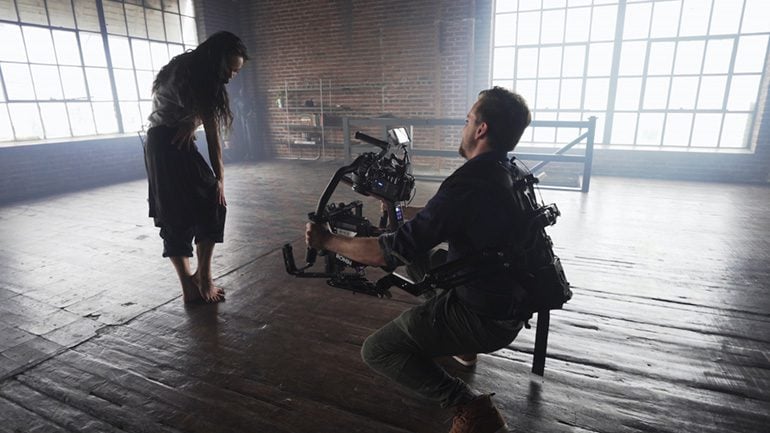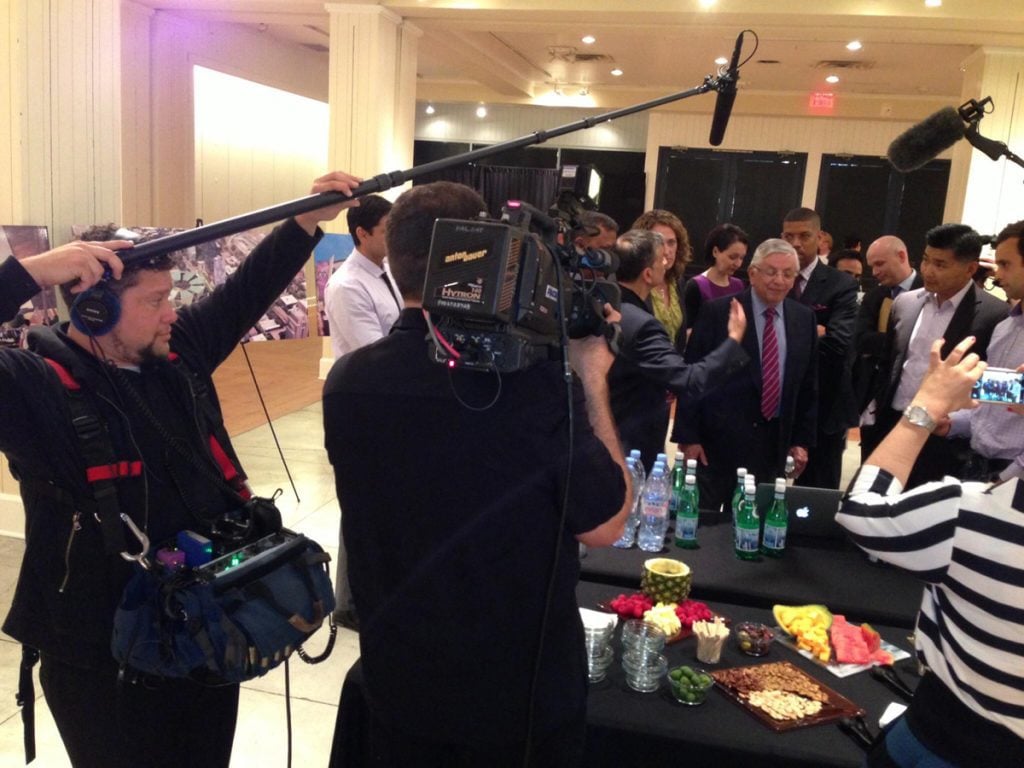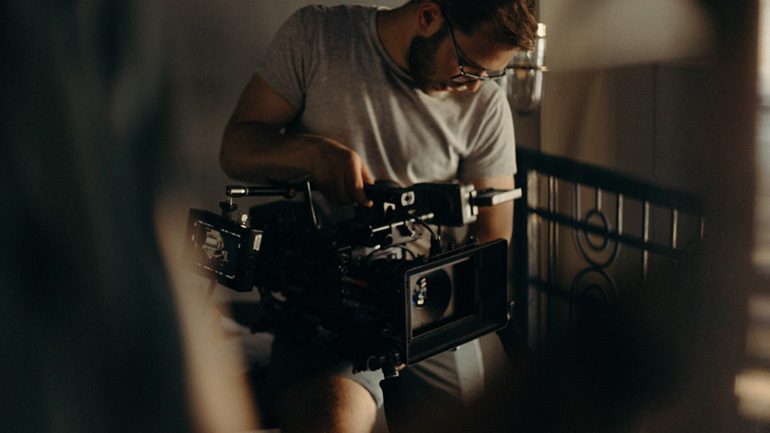Advice for young filmmakers and students from Daryn Okada, ASC, Neten Chokling, Amy Nicholson, and more…
Pictured above: Los Angeles, United States. Location provided by the IDEA Lofts, Wrapal.com, and gear provided by Aaron Grasso. Captured by ShareGrid Co-Founder Brent Barbano.
10 Best Tips for Young Filmmakers
Tip #1
“The one piece of advice I would say is spend most of your energy shooting, not planning the steps to your career out. I think those things happen on their own. But what you need to have is the work and the experience of doing that work. And that’s going to probably be more valuable in the long run, and you’ll just be able to discover more about yourself. Because people aren’t looking to hire somebody who shoots like someone else. They’re looking to hire somebody that’s an individual.”
~Daryn Okada, ASC
Check out our Exclusive Interview with Daryn Okada, ASC. Mr. Okada talks with us about how he got started in cinematography, discusses his most favorite and challenging scene to light and to shoot in “Wild Hearts Can’t Be Broken”, and shares with us his advice on shooting action sequences, and much more…
Daryn Okada, ASC was 21 years old when he earned his first narrative film credit as a cinematographer for Nomad Riders in 1981. He earned an Outstanding Achievement Award nomination from the American Society of Cinematographers for the Mini Series In a Child’s Name in 1991. Okada has compiled more than 43 feature films and television credits, including Anna Karenina, Lake Placid, My Father the Hero, Dr. Doolittle 2, Cradle 2 the Grave, Mean Girls, Stick It, Just Like Heaven, Baby Mama and Harold & Kumar Escape from Guantanamo Bay. The Goods: The Don Ready Story, starring Jeremy Piven, and Ghosts of Girlfriends Past, which stars Matthew McConaughey, Jennifer Garner, and Michael Douglas.
Tip #2
“It comes down to practicing your craft. If you’re a director, you’ll work with actors. Grab some actors and a script, even if it’s a script that everybody knows. And direct actors, talk to actors. Learn all the departments. Understand what all the people do so that people can’t treat you like an idiot. Because I think again the bigger the scale of the project and certainly where we are at our professional lives, there are times when I find people talking to me because they assume that I don’t know what they do. I have the advantage of actually having really worked my way up in this business, and most of the time I’ve done that person’s job at some point in my life. So it’s all about learning your craft and practicing it.”
~Adam Matalon
Read this article written by Adam Matalon, “Developing the Common Language between a Director and DP: Collaboration is Key“. “I think that the current ease and accessibility of digital media has created an environment of isolation for many young filmmakers. It is a truer statement that most first-time directors are also shooting and editing their own film rather than having the luxury of other creative individuals by their side. While I applaud the availability of the technology and the ability to refine a workman’s craft with little more than a camera and a laptop, it has created an environment where it is often unfamiliar to evolve a creative vision with others.”
Tip #3
“Let go of trivial principles that may defeat your career goals.”
~Bing Rao
Tip #4
“Stay focused. You’ve got to keep your vision. Because when you get there with everybody you want people to feel involved, you want their energy, but at the same time, you’ve got to limit the amount of information you’re going to allow them to inundate you with. You’ve got to [say] – okay, no, no, that’s not gonna work, thank you, though. Then you’ve got to really stay focused because you could have people twisting you and spinning you into different directions. You’ve got to stay focused and hold on to your vision and demand the respect and what you want to shoot.”
~Michael Damian
Tip #5
“Know yourself. This isn’t a Zen theory. It’s practical. Find meaning in what you do, and make sure that it’s meaningful to you first. Don’t do things just to satisfy other people. It sounds contradictory, but this is the best way to understand and expand your audience. If you were the one sitting in the theatre, and this thing came up, and you didn’t know who made it or where it came from, but it happened to be your film, the way that you watch that film is the most telling thing of all. Take into consideration the advice of others, especially those with experience and taste, but don’t forget that perspective. And if you can satisfy that audience member, that spectator who happens to be yourself, you will be making a film that many other people will want to watch, it’s almost guaranteed.”
~Phillip Van
Tip #6
“Don’t short-change any aspect of the process. Keep an eye on everything that goes into your frame, everything should have a reason for being there. Use real actors, plan your days, and don’t leave anything to chance. And feed your crew! Fed crews are happy crews.”
~Todd Davis
Read more in “Behind the Scenes of Award-Winning Short: In the Tradition of My Family,“ an interview with Director Todd Davis conducted by Taryn Bensky. In Todd Davis’ award-winning short film, “In the Tradition of My Family”, a tradition of violence that goes back generations is threatened when one father hesitates to indoctrinate his son into the insanity. The gothic family saga is directed by Todd Davis, who was a 41-year-old film production graduate student at Boston University. The movie was shot on Super 16mm film by cinematographer Austin de Besche, and edited by Emmy award-winner (Desperate Housewives) and two-time ACE Eddie award-winner (Sex and the City) Michael Berenbaum, ACE.
Tip #7
“If your film is ‘commercial,’ you’d have an easier time getting funds. If you want to make an art (independent) film, it is difficult to make because of the limited audience, and hence, limited budget. I found that there is still a way to make your ‘dream film’ (independent). Don’t think what you would like to make, you should make ‘what people want.’ One should apply this for one’s FIRST film, get some money and then proceed on to independent films. I found it quite important.”
~Neten Chokling
Tip #8
“I would pass on the advice that someone told me. Pick a subject matter that you absolutely love because the process is so grueling. Pick something that you have so much heart for because when the going gets tough – and it’s late at night, you’re the only person working on your film, you’re humped over a computer, you’ve run out of money, you’re too tired for it, or somebody doesn’t like your film – the thing that will keep you going is the love you have for the project.”
~Amy Nicholson
Read more in our exclusive interview, “An Experienced AdWoman Takes On the Film Business: Director Amy Nicholson Finds Parallels in Advertising & Film with Documentary, ‘Muskrat Lovely.’“ The award-winning filmmaker talks ‘documentary’, how she got her start, approaching film festivals and PBS’ Independent Lens, and much more… “I did everything; drove the car, made sandwiches, I’m not kidding. I did a lot of research and a lot of scouting on my own. I really knew what I wanted to get before I got there. I tried to find out as much as possible about the pageant not having seen it before and not having seen their process. I tried to meet everybody before we filmed them. I tried to get permission, insurance, rented vehicles – I did the things I knew needed to be done as a producer. And then as a director, I did a lot of research that way too; made an outline –a very tight outline for myself because I wanted to shoot on film.”
Tip #9
“Make a movie, is really it. Get out and make one. Stop talking about it. You’re a filmmaker, you make films. Just like writers write. So, yeah, pick up a camera, and make a movie. Stop talking about it.”
~Kevin Burke
Read more in our flashback interview, throwback, oldie-but-goodie, “Sex & Camping,” where we go behind the scenes with film director Adam Matalon and cinematographer Kevin Burke. For example, we asked, How significant was the Panasonic SDX900? “It’s significant for a lot of reasons. …It’s a very affordable camera, but just the looks that you can get with the camera, the amount of control you have with that camera as far as painting and creating the image that you want. It’s almost like having Photoshop at your disposal because you can totally control saturation. And the nice thing about it as well is that you don’t really have to do a lot of lighting with that camera to get a beautiful image. I think with video you still have to watch your contrast and be mindful of focus and depth of field… But the camera just gives you a lot of control, and it’s just a very nice camera to work with. Actually, since I’ve been using it, I’m really less likely to ever want to shoot 16 mm again. It’s one thing with 35 – but this camera, I think, actually rivals 16 mm as far as image resolution…”
Tip #10
“It’s very important to take time and think about what approach you’re taking in your film, and be consistent. Also, I think shooting film for our first project in school really helped us be selective about what to shoot, what is valuable and useful in pushing the story ahead, and what is maybe good, but has no bearing on the film’s point. A lot of times people new to documentary work will spray everything down with the camera: meaning they’ll shoot everything in sight. It’s an understandable instinct, but it makes things so much harder in the editing room. Be judicious in what you shoot, and I think that sharpens your intention in what you’re trying to achieve with the film, and makes editing a lot more manageable.”
~Ben Wu




